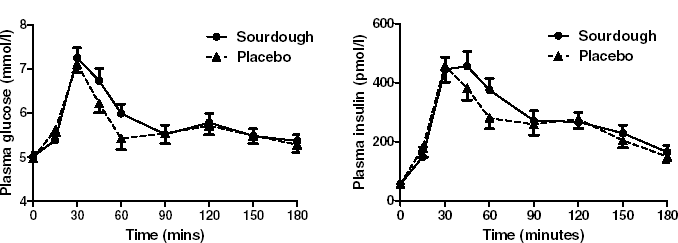There is some evidence indicating a role for SCFA such as propionate and acetate, produced during the colonic fermentation of non-digestible carbohydrates, in regulating appetite. For example, in previous studies oral supplementation with propionate and acetate has been reported to enhance satiety and reduce the glycaemic and insulinaemic response post-prandially(Reference Ostman, Granfeldt, Persson and Bjorck1, Reference Liljeberg, Lonner and Bjorck2).
The aim of the present study was to investigate the acute effects of the inclusion of sourdough bread (made with a starter culture favouring propionate production) as a component of breakfast on appetite, satiety and metabolic response compared with a visually-identical taste-matched placebo bread (no starter culture).
In this randomised single-blind cross-over study twenty participants (nine male, eleven female) aged 25.1 (sd 4.6) years identified as unrestrained eaters consumed a breakfast based either on sourdough (providing 7.35 mmol propionate) or placebo (providing 0.10 mmol propionate) bread. Participants were asked to complete visual analogue scales (VAS) to rate taste and palatability. Effects on appetite were subjectively assessed at baseline and every 30 min postprandially using VAS, and were quantitatively assessed by providing an ad libitum pasta meal 3 h postprandially. The glycaemic and insulinaemic response was monitored with regular blood sampling via an indwelling cannula. Participants returned ≥1 week later to consume the other bread. Control for menstrual fluctuations in female participants was included.
The VAS ratings for taste and palatability of the test breakfasts did not differ significantly between bread type. No significant effects of the sourdough bread were found on subjective appetite ratings, except the desire to eat something sweet (two-way repeated measures ANOVA; P=0.024). Furthermore, mean intake of the ad libitum pasta meal 3 h following the sourdough breakfast (531 (sd 163) g) did not differ from that following the placebo breakfast (527 (sd 188) g). However, while no significant differences in plasma glucose response were found, plasma insulin appeared to change differently over time, with a trend approaching significance (P=0.061) when analysed by two-way repeated measures ANOVA.

The results suggest that propionate-rich sourdough bread as part of breakfast does not acutely influence subsequent appetite or glycaemic response, and may even slow down insulin clearance. This finding is contrary to previously-reported data showing that bread with added propionate leads to significantly higher satiety ratings and reduces glycaemic and insulinaemic responses when compared with placebo(Reference Liljeberg, Lonner and Bjorck2). However, unlike the present study, the bread was significantly less acceptable than placebo and effects on actual intake were not assessed.


